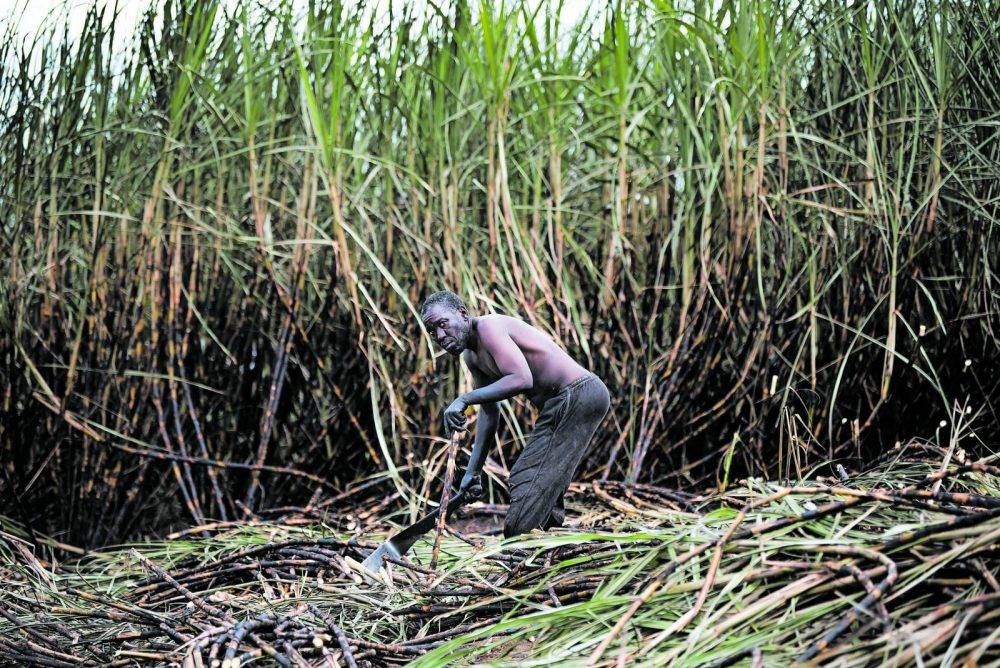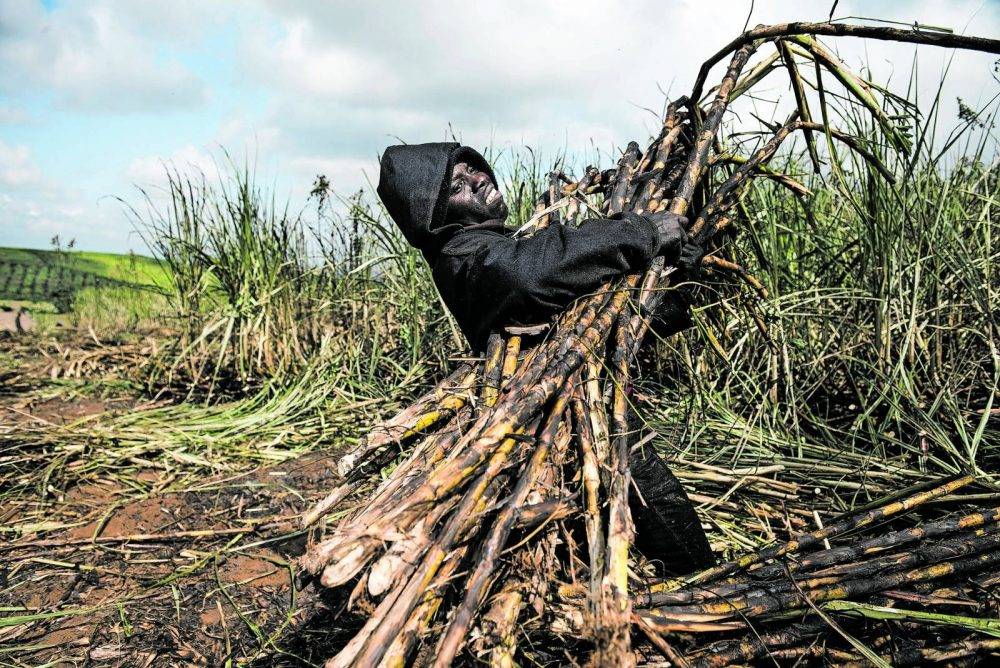(Delwyn Verasamy/M&G)
It’s impossible for me to operate without being paid
Nkosinathi Msweli
Sugar cane farmers have warned that they will not be able to continue operating if they are not paid for the produce they supply to mills.
SA Canegrowers says the failure by Tongaat Hulett to pay more than R900 million which was due to the South African Sugar Association (Sasa) at the end of March, as well as default by Gledhow Sugar Company, led to an 8% drop in the price growers receive for the cane processed for the 2022-23 season.
Tongaat Hulett entered into voluntary business rescue in October because it was struggling to pay its creditors. Gledhow mill entered into voluntary business rescue in March this year.
This spells doom for the cane growers who supply to these mills, some of them exclusively.
They include Nkosinathi Msweli, a farmer in Stanger, who will probably have to shut down if he is not paid, even for just one month.
“It’s impossible for me to operate without being paid,” Msweli told the Mail & Guardian.
“At this stage, I’ve got no workers. I’ve told them to stay away until I start harvesting, and see that I will be paid, and then they can come back because now I don’t have anywhere to get the money to pay them.”
Msweli had to let go seven permanent employees as he was uncertain about getting payment for the 2023-24 season, which started last month.
 Bitter taste: Small-scale farmer Babbo Lekha is concerned that the mill might close down if producers did not supply it. (Delwyn Verasamy/M&G)
Bitter taste: Small-scale farmer Babbo Lekha is concerned that the mill might close down if producers did not supply it. (Delwyn Verasamy/M&G)
“There is nothing I can do. My hands are tied. With the new season there is nothing that is in black and white … in terms of payment we are not sure whether they will pay,” said Msweli, who is bound by an agreement with Tongaat to supply his sugar cane exclusively to the company.
“Tongaat Hulett owned these farms and, at the dawn of democracy, they sold the farms but with a contract that mandates you to supply exclusively to their mills,” he said.
“It was a 50-year cane-supply agreement. In 2018, they reduced the supply agreement to 10 years, so now I’m in my fifth year with five more years remaining. Only then can I choose to take my sugar cane elsewhere. But mills are far and few in between, so we don’t have any choice, anyway.”
Msweli started farming in 1996 when he bought his 128-hectare farm from Tongaat Hulett through a 20-year bond from Ithala Bank. He worked at Tongaat Hulett as a clerk, working his way up to assistant manager, before buying his farm.
Aside from Msweli being locked in the cane-supply agreement with Tongaat, transporting his sugar cane to other mills would also be a logistical challenge.
“It becomes a distance issue because other mills are far. The nearest option is Gledhow, however, when my five years comes to an end, I cannot say whether there will be space in Gledhow to accommodate me.
“It’s also a space thing. If there is no space to take me, then there is nothing I can do,” he said. As a small-scale farmer, Msweli has to produce about 450 tonnes of sugar cane a month to get paid.
The Mail & Guardian also spoke to some sugar cane farmers who either had inherited their farms or have a family history. They are in a slightly better position than Msweli, in that they were not being paid for about three months before it became impossible for them to carry on.
 Dire straits: Stanger cane farmer Nkosinathi Msweli has had to retrench all his workers as he cannot be sure the mill will pay him
Dire straits: Stanger cane farmer Nkosinathi Msweli has had to retrench all his workers as he cannot be sure the mill will pay him
These farmers are descendants of the Indian indentured labourers who were brought to what was then Natal from India to work on the sugar cane fields in the 1800s.
One of them, Butch Subramani, said the uncertainty over payment had forced him to cut back.
“Sometime last October, we first came to know that we have a problem with the mill [Tongaat Hulett] and that they won’t be able to pay us in the months of October, November and December,” he said.
“Before we knew it, we were told that they are in business rescue … Some of us did not want to deliver our cane because we were not guaranteed payment for it.
“We panicked because we didn’t know how to sustain our labour, pay our creditors and sustain our livelihoods. We had to curtail the way we live our lives.”

Subramani, who comes from a farming family but worked in the textile industry, has only four years under his belt as a sugar cane producer. He bought the farm using his retirement money after turning 60 and employs 10 people.
“After receiving the final payment in March, we had to make a decision whether to strike or continue to supply. All the growers sat down and discussed this extensively,” he said.
“The conclusion was that we are in a catch-22 situation. We need the mill and the mill needs us. If we don’t get our cane crushed, and if we don’t take the risk to have it crushed and not get paid, then all of us are going to lose and the industry will collapse.”
 Cut up: Many sugar farmers in KwaZulu-Natal are in trouble after the mill at Tongaat Hulett, which is in business rescue, failed to pay them for their produce. (Delwyn Veasamy/M&G)
Cut up: Many sugar farmers in KwaZulu-Natal are in trouble after the mill at Tongaat Hulett, which is in business rescue, failed to pay them for their produce. (Delwyn Veasamy/M&G)
He explained that sugar cane, once harvested, does not have a long shelf life and producers have to deliver it to the mill quickly.
According to a paper published by the University of Hawaii, sugar cane can be stored under cool, moist conditions for about two weeks before it dries out.
“The solution right now is that we deliver our cane at a risk … We will see when the new season begins. If the industry doesn’t survive, there is too much to be lost, unemployment in this country will just skyrocket, and we cannot afford that. We have to find a solution to the sugar industry,” Subramani said.
Any job losses would be dire for KwaZulu-Natal, which already has an unemployment rate of 31.4% of the labour force, according to Statistics South Africa’s fourth quarter 2022 numbers.
Another small-scale farmer, Babbo Lekha, was worried that if producers did not supply the mill, “they might just close it down”.
“We are stuck between a rock and a hard place,” he said, noting that the two mills on the North Coast absorbed 1.6 million tonnes of sugar cane a month.
“What will happen to that sugar cane if the mills close down?” wondered Lekha, who employs six permanent workers and hires contractors when it is time to harvest.
He said he would start feeling the pressure after three to six months of not being paid.
 Cut up: Many sugar farmers in KwaZulu-Natal are in trouble after the mill at Tongaat Hulett, which is in business rescue, failed to pay them for their produce. (Delwyn Verasamy/M&G)
Cut up: Many sugar farmers in KwaZulu-Natal are in trouble after the mill at Tongaat Hulett, which is in business rescue, failed to pay them for their produce. (Delwyn Verasamy/M&G)
“That threatens our livelihoods. We have standard overheads that are to be expected every month. I have labour that I cannot just get rid of. You have your home bills and your electricity bills, insurance. These are costs that are threatened when we don’t get paid,” he said.
Some farmers are opting to diversify, with macadamia nuts, bananas and avocados proving to be decent alternatives.
“I started farming macadamia nuts three years ago but I am nowhere near harvesting,” said Lekha. “It takes about seven years. I also farm bananas but I sell them as green bananas in the Indian market, at a lower margin. That way, they don’t have to go through grading.”
It would cost the cane growers a lot of money to introduce or switch to other crops or livestock, Subramoney said, adding: “I don’t even have the space to think about farming anything else.”
Msweli weighed in: “In our space, it’s very difficult to diversify because macadamia is expensive. We were told that we need about R250 000 to establish a hectare. Where are you going to get that money if you are a small-scale farmer?
“Then you have to wait seven years to start harvesting, 10 to get to full production, and what will you be doing all this time?”